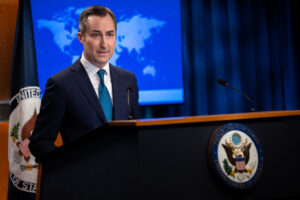‘Socio-economically weak Muslims prone to becoming targets of Islamophobia in Denmark’
ISTANBUL (AA) – In Denmark, Muslims who are socially and economically backward, those who migrated to the country in recent years, or those seeking asylum are the ones most likely to suffer from anti-Muslim discrimination and racism, according to an expert.
“My worry is that these policies (against Muslims), they often vilify Muslims in general but the ones they hit the most are the ones who are socioeconomically vulnerable, the ones who don’t have citizenship, the ones who are more recent migrants or asylum seekers. I think that’s where my big contention is with Islamophobia in Denmark,” sociologist Amani Hassani said.
Hassani, a Danish Muslim and a research director at the Center for Muslim Rights in Denmark, shared her views on the current state of Muslims in Denmark.
The European Islamophobia Report 2023 released on Tuesday named Denmark as the most vulnerable country for Muslims, along with France and Austria.
According to Hassani, Muslims on the lowest rung of the social and economic ladder, as well as refugees, face discrimination not only due to the rising anti-Muslim sentiments but also stricter citizenship and the country’s ghetto policies targeting low-income Muslim communities.
Islamophobia is taking away their avenues to have a voice in society, and one way of doing that is by removing citizenship or the ability to gain citizenship, she said.
The World Population Review of 2019 reported that 313,713 Muslims are living in Denmark — around 5.4% of the country’s overall population.
Anti-Muslim rhetoric
The discourse against Muslims is not sudden, the sociologist said, adding that the hate speech of politicians against Muslims, which are often openly acceptable in society, has been the case for several years.
“What we saw in 2022 has been (happening for) many years leading up to that point. …. Now, it has become much more acceptable in a political speech to specifically say ‘Muslims are the problem.
“This won’t come out in policies themselves as they (politicians) have to adhere to the Danish constitution which says you can’t discriminate against religious minorities. But it will come out in different ways, so instead of saying Muslims, the politician will then write non-Westerners in policy documents and in legislation,” she stressed.
Vilifying Muslim citizens and Muslims coming into the country, and seeing them as potentially problematic has become more acceptable within political rhetoric, according to Hassani.
Different levels of anti-Muslim discrimination
As a Muslim, one can experience different kinds of discrimination, starting from “microaggressions” from people that question Muslims’ belonging to Denmark.
People can also undergo structural discrimination, which is seen in policies, where someone from a Muslim-majority country may have harder access to housing or jobs.
“Another way of expressing discrimination is actual hate and violence on the streets. We have seen an increase in hate crimes against Muslims in recent years,” said the expert, who was born and raised in Denmark.
A 2018 report by the Danish National Police indicates that out of 112 hate crimes that were religiously motivated, 56% were Muslim victims.
European Islamophobia Report 2022 shows that people from Africa or the Middle East have a significantly greater risk than Danes of being arrested or charged without being convicted.
“According to the analysis, the risk of being charged without a conviction is 27% higher for immigrants and 45% higher for descendants compared to people of Danish origin,” the Institute of Human Rights in Denmark noted, adding that there is a problem with discrimination and ethnic profiling within the police force.
Human rights activist Lamies Nassri in the Islamophobia report also noted the ongoing discussion about the government’s attempt to close Muslim schools in 2022. In Denmark, the Commission for the Forgotten Women’s Struggle, last year recommended a hijab ban in elementary schools, Nassri said.
‘Good Muslim’ vs ‘bad Muslim’
The Danish society makes a distinction between professionally and financially sound Muslims possessing Danish citizenship and those who might be asylum seekers or recent immigrants, according to Hassani.
“There’s (also) a counter-narrative within society that celebrates ‘the good ones,’ (that) the good Muslims are the ones who are well-educated and have a good position, and (that) we (Denmark) want to keep them. … You see that in political rhetoric as well. … We want to do everything we can to celebrate the doctors, the engineers. … and then, there are the ‘bad ones,’ we got to do everything we can to make sure that they don’t come in the country in the first place, and when they are here, try to make it (their life) as difficult as possible,” she stressed.
Stricter policies for Muslim immigrants
While Ukrainian refugees were welcomed to the country, and got jobs and housing, with their asylum applications accepted, the treatment was not the same for Syrian refugees, who are being pushed back, she also said.
On average, it takes 19 years for people to get Danish citizenship, according to Hassani, who said the recent anti-migrant wave might make things harder.
“What I worry for the future in Denmark is that we are going to have a growing population … born and raised in Denmark, who do not have access to citizenship, which is the main thing that I predict, will be a major issue for democracy in Denmark essentially.”









